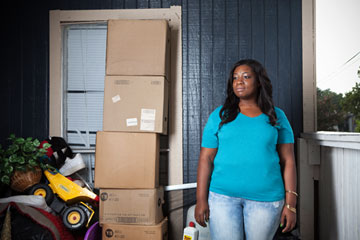
An uninsured single mother of two, Nicolette Cooksey is one of nearly 2 million Texans who would have been covered under the Affordable Care Act if the state had opted to expand Medicaid.
(3 of 4)
That absence of information has contributed to a misunderstanding of the law. Terry Thrash, an uninsured waiter who works in downtown Houston, was planning to pay a federal penalty for not having health insurance in 2014 rather than purchase coverage through Obamacare. Thrash is precisely the sort of person the White House hopes to draw in: young, relatively healthy and uninsured. When he learned that his income level would exempt him from the mandate to have insurance and allow him to qualify for a subsidized, midlevel insurance plan costing about $80 per month through Obamacare, he was shocked. "Now that it's getting closer, I feel a sense of panic among those around me because we're so uninformed," Thrash says. Suezen Hoza Salinas, an uninsured single mother of two living in Houston, says she has been trying to research ACA insurance options online. "I feel like I know some of the basics," she said recently, "but who's going to help me navigate this?"
The Math on Medicaid
In texas, opposition to the ACA is both philosophical and financial. The law is seen as an unwelcome federal intrusion into the affairs of a state that doesn't want any part of a massive new entitlement program. Perry also points out that expanding Medicaid would add costs to a program that already consumes one-quarter of the state's budget. About half of all children in Texas are covered by existing government programs. Medicaid alone pays for more than half of all births in the state. The law is "a recipe for disaster ... an asteroid about to enter the atmosphere," says Representative John Culberson, a Republican who represents southwest Houston in Congress.
But the terms of the Medicaid expansion might seem to cast doubt on such economic reasoning. The federal government would pay 100% of the cost of covering those newly eligible for the program until 2017, phasing down to 90% after 2020. (Current federal contributions to Medicaid are from 50% to 75%, depending on the state.) A recent report by Texas' former deputy comptroller found that while a Medicaid expansion would increase the cost of the program, much of the extra spending would be offset by savings in other state-funded programs that pay for health care for the poor. According to the U.S. Department of Health and Human Services, Texas will leave $79 billion in federal funds on the table over the next 10 years by not expanding Medicaid.
That math is the main reason the Greater Houston Partnership, one of the state's leading business organizations, endorsed a Texas Medicaid expansion earlier this year. "The economics are such that it just doesn't make sense [not to expand] from any perspective other than posturing and politics," says Dr. Paul Klotman, head of the College of Medicine at Baylor University and chairman of the partnership's health committee.
Filling the Gap
When nicolette cooksey needs health care, she goes to a local clinic that lacks an emergency room or specialists to treat serious ailments. But it does receive federal funds; it is one of about 9,000 such facilities across the country that will get $11 billion through the ACA to meet health care needs for the poor and those who remain uninsured despite the law. Even with Texas' fervent opposition to Obamacare, the amount of public money spent on health care in the state appears likely to grow under the law.
